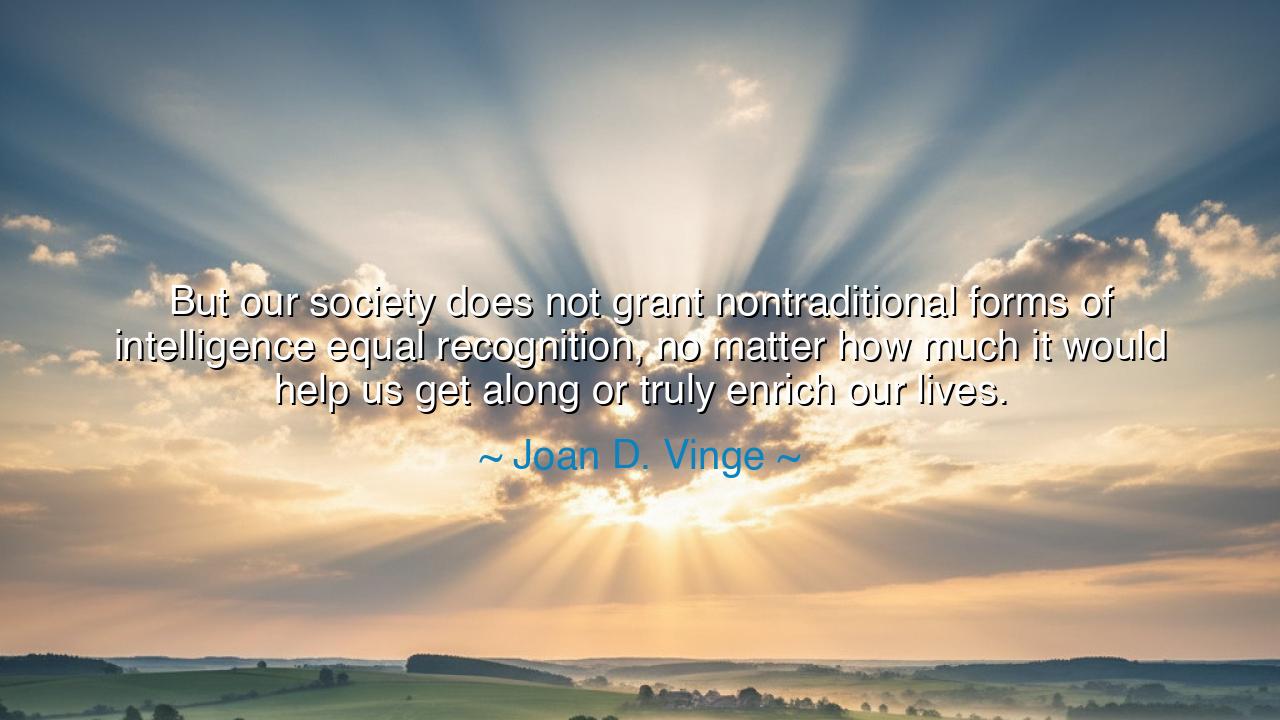
But our society does not grant nontraditional forms of
But our society does not grant nontraditional forms of intelligence equal recognition, no matter how much it would help us get along or truly enrich our lives.






When Joan D. Vinge wrote, “But our society does not grant nontraditional forms of intelligence equal recognition, no matter how much it would help us get along or truly enrich our lives,” she spoke as both a writer and a philosopher of the human condition. Her words pierce through the glittering facade of modern civilization to reveal a deep and quiet injustice: that the world measures intelligence too narrowly, worshiping logic and numbers while neglecting the wisdom of the heart, the creativity of the spirit, and the intuitive understanding of connection. Her lament is not one of cynicism, but of sorrowful truth—the awareness that in exalting certain minds, society diminishes others who might heal, inspire, and transform.
The origin of this insight springs from Vinge’s lifelong engagement with both science and imagination. As a science fiction author, she dwelled in the realm where logic meets wonder, where technology and empathy must coexist. She saw, perhaps more clearly than most, that intelligence wears many masks: the analytical, the emotional, the creative, the spiritual. Yet our age, she warns, has chosen to crown only one form—the rational mind, the one that quantifies and categorizes. The child who paints galaxies in her mind, the worker who senses harmony where others see chaos, the dreamer who feels truth through music—all are too often dismissed as lesser minds. Vinge’s words awaken us to the poverty of such blindness, and to the wealth that could flourish if all intelligences were honored.
The ancients understood this truth far better than we. In the schools of Plato, reason was taught beside art, philosophy beside myth. The Greeks believed that wisdom (sophia) was not a single virtue but the harmony of many. Aristotle spoke of phronesis, the practical wisdom of living well; Socrates exalted the examined soul; the poets of Delphi taught that emotion, intuition, and beauty were themselves pathways to truth. Even the Eastern sages—Confucius, Laozi, and Buddha—taught that the wise man balances intellect with compassion. But in the march of modernity, we have built temples only to one god: rational intelligence, forgetting that the heart, too, has its own logic.
Consider the story of Nikola Tesla, the visionary inventor. His genius was not confined to the cold mathematics of machines—it was illuminated by dreams, visions, and intuition. Tesla saw his creations not as calculations, but as revelations. Yet his contemporaries, bound by conventional measures of intelligence and success, dismissed him as eccentric, even mad. It was only long after his death that the world recognized the brilliance that had once been shadowed by misunderstanding. Tesla’s story is the story of many—souls whose light shines in a spectrum society refuses to see. Vinge’s words remind us that the world loses much when it cannot recognize the many colors of the mind.
To “grant nontraditional forms of intelligence equal recognition” is to open the door to a fuller humanity. The artist’s empathy, the mother’s intuition, the craftsman’s wisdom of the hands—all are forms of understanding as vital as the scientist’s analysis or the scholar’s reasoning. True civilization is not built upon competition between these, but upon their union. When intellect and imagination join hands, when reason and compassion speak the same language, society becomes whole. For what use is knowledge if it does not teach us to live wisely? What value is intelligence if it cannot teach us to love?
The lesson here, passed down like a lantern through the ages, is this: honor every form of understanding. Do not measure worth by the narrow rulers of test and title. Seek intelligence not only in books, but in the quiet gestures of kindness, in the music of thought, in the eyes of those who see differently. The farmer who knows the rhythm of the soil, the healer who feels the pain behind another’s silence, the child who invents worlds in play—all possess wisdom the world sorely needs.
So let this be the teaching of Joan D. Vinge: expand your vision of intelligence until it embraces the full spectrum of humanity. Listen not only to the voices of logic, but also to the whispers of empathy and imagination. For when every form of knowing is given its rightful place, the walls that divide us crumble, and what remains is a richer, wiser, more compassionate world. Let us remember, then, that the mind is not the measure of the soul—it is only one of its many shining mirrors. And when all mirrors are seen together, we will finally glimpse the face of true wisdom.






AAdministratorAdministrator
Welcome, honored guests. Please leave a comment, we will respond soon